Gyeongju, the ancient capital of the Silla dynasty, is a remarkable UNESCO World Heritage site that captivates visitors with its well-preserved historical treasures. This guided day tour from Busan takes travelers on an immersive journey through the city’s rich cultural legacy, offering exclusive access to iconic landmarks like the magnificent Bulguksa Temple and the serene Seokguram Grotto. Beyond the iconic sites, the tour also delves into the charming traditional villages of Yangdong and Hahoe, providing an authentic glimpse into Korea’s time-honored traditions. With seamless transportation and an English, Chinese, or Korean-speaking guide, this tour promises a hassle-free exploration of Gyeongju’s cultural heritage. What lies in store for those who embark on this captivating adventure?
This experience made our list of the 25 Best Tours In Busan.
Key Points
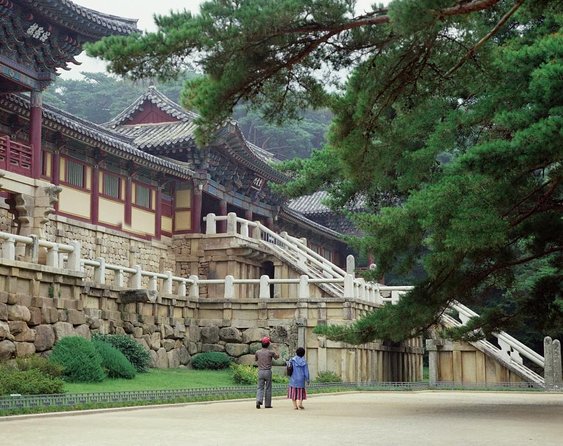
-
Guided day tour from Busan to Gyeongju, the ancient Silla dynasty capital, to explore its UNESCO World Heritage sites and traditional villages.
-
Visit renowned landmarks like Bulguksa Temple, Seokguram Grotto, and the Gyeongju Historic Areas, showcasing Silla’s architectural and cultural legacy.
-
Immerse in the well-preserved Joseon-era heritage at the UNESCO-listed Yangdong and Hahoe traditional villages.
-
Hassle-free transportation by air-conditioned coach or minivan, with an English, Chinese, and Korean-speaking guide accompanying the group.
-
Inclusive of entrance fees to historical sites, but excludes meals, travel insurance, and hotel pickup/drop-off.
Ancient Silla Dynasty History
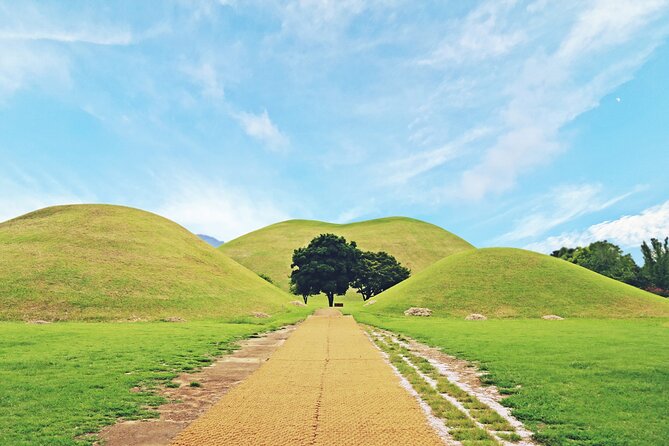
The ancient Silla dynasty, which ruled over parts of the Korean peninsula from the 2nd to the 10th century, left an indelible mark on the city of Gyeongju, which served as the capital during this period.
Silla’s legacy can be seen in the city’s abundance of well-preserved historical sites and cultural relics, such as ancient temples, royal tombs, and traditional villages.
Visitors to Gyeongju can enjoy the rich heritage of this bygone era, gaining insights into the architectural, religious, and social aspects of the Silla civilization.
Loving the local insights? Here are more guided experiences we recommend in Busan
UNESCO World Heritage Sites
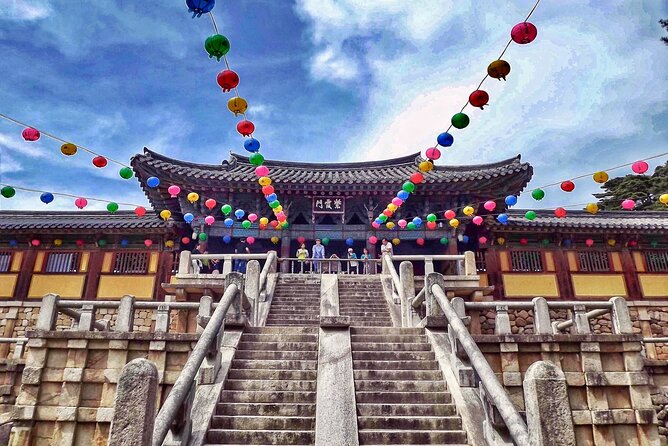
Underscoring Gyeongju’s enduring significance, the city’s rich Silla heritage has earned it UNESCO World Heritage status, cementing its place as a premier cultural destination in South Korea.
The UNESCO-listed sites include:
- Bulguksa Temple, a 6th-century Buddhist sanctuary renowned for its stunning stone pagodas and ornate carvings.
- Seokguram Grotto, a magnificent 8th-century rock-carved Buddhist shrine featuring a serene Buddha statue.
The Gyeongju Historic Areas encompass the ancient capital’s royal tombs, temples, and traditional villages, offering a captivating glimpse into the Silla dynasty’s Golden Age.
These well-preserved treasures make Gyeongju a must-visit destination for travelers seeking to enjoy Korea’s profound cultural legacy.
Traditional Villages and Culture
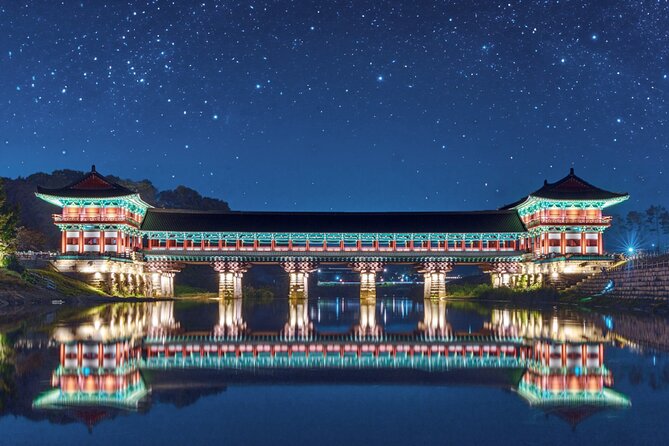
Beyond Gyeongju’s renowned temples, visitors can explore the city’s well-preserved traditional villages, offering a captivating glimpse into Korea’s living cultural heritage.
One such gem is Yangdong Village, a UNESCO-listed site showcasing the architectural styles and lifestyles of the yangban, the noble scholar-gentry class of the Joseon dynasty. Strolling through its charming alleyways, visitors can admire the elegantly crafted hanok houses, tranquil pavilions, and serene ancestral shrines.
Another highlight is the picturesque Hahoe Folk Village, known for its well-preserved Confucian cultural landscape and traditional thatched-roof homes. These villages provide an immersive experience, allowing travelers to step back in time and gain a deeper appreciation for Korea’s rich traditions and timeless way of life.
Itinerary and Tour Highlights
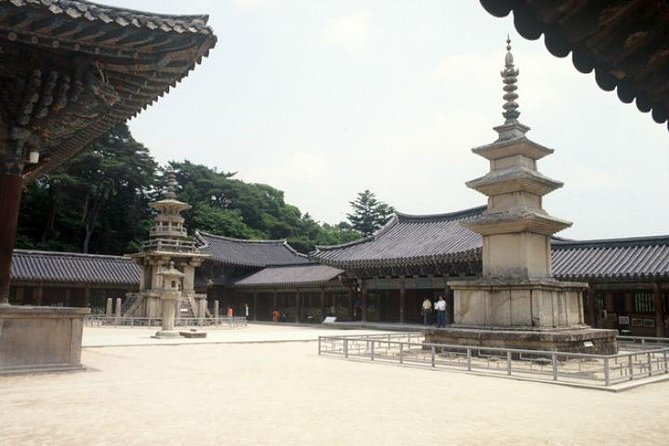
On this comprehensive guided tour from Busan to Gyeongju, visitors can explore the city’s UNESCO World Heritage-listed treasures and enjoy its ancient Silla dynasty roots.
The tour begins with a visit to the serene Anapji, a beautifully landscaped pond surrounded by pavilions and gardens that once served as a royal leisure site.
Travelers then venture to the magnificent Bulguksa temple, a masterpiece of Buddhist architecture boasting intricate stone carvings and pagodas.
The itinerary also includes:
- A stroll across the picturesque Woljeonggyo Bridge, renowned for its stunning views.
- A stop at the traditional Yangdong Village to witness well-preserved Joseon-era architecture and way of life.
- Round-trip transportation from central Busan, ensuring a hassle-free day of exploration.
Inclusions and Exclusions
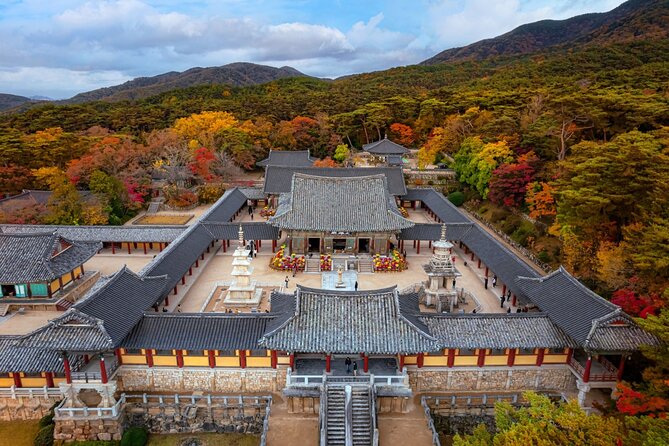
This guided tour from Busan to Gyeongju typically includes round-trip transportation by air-conditioned coach or minivan, as well as an English, Chinese, and Korean speaking guide to provide commentary throughout the day.
However, the tour doesn’t cover meals, travelers’ insurance, or hotel pickup and drop-off, which are excluded from the package.
Entrance fees to the various historical sites and landmarks visited, such as Anapji, Bulguksa temple, Woljeonggyo Bridge, and Yangdong Village, are included in the tour price.
Fascinated by Busan's past? More historical tours we've covered
- Old Korea Thousand History Tour of Gyeongju From Busan
- Busan History and Market Food Tour With Local Chef
- UNESCO Heritage Full Day Tour in Gyeongju From Busan
- Gyeongju the UNESCO World Heritage Sites Tour(Private Tour)
- Korean UNESCO World Heritage Tour Including Gyeongju, Andong and Daegu(2n3d)
- Gyeongju City Tour From BUSAN – UNESCO World Heritage Site
Meeting Points and Logistics
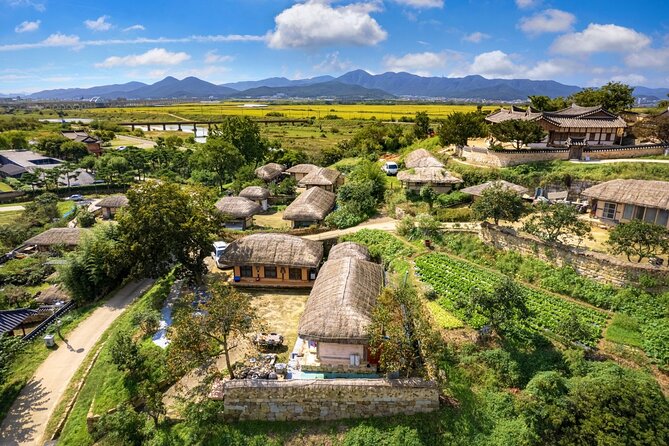
Multiple meeting points are available for this guided tour from Busan to Gyeongju, allowing travelers flexibility in starting their journey.
Confirmation of the exact meeting location will be provided up to 24 hours before the scheduled activity.
This tour offers several convenient pick-up options:
- Central Busan location
- Haeundae area
- Seomyeon area
Travelers will board an air-conditioned coach or minivan and depart for the ancient city of Gyeongju.
The tour guide, fluent in English, Chinese, and Korean, will accompany the group throughout the day’s activities.
With a maximum group size of 43 travelers, this guided excursion ensures a personalized experience exploring Gyeongju’s UNESCO World Heritage sites.
Confirmation and Accessibility
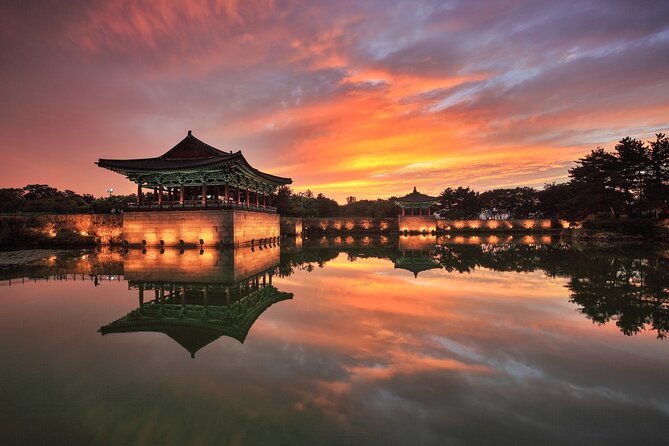
Travelers can expect to receive confirmation of their booking at the time of purchase, ensuring they’ve all the necessary details leading up to the tour.
The tour isn’t wheelchair accessible, but strollers are permitted.
The pickup and drop-off locations are conveniently located near public transportation, making it easy for participants to get to and from the meeting points.
Infants must sit on laps during the tour.
Most travelers can participate, and the maximum group size is 43 people, providing an intimate and personalized experience.
With clear confirmation and accessible logistics, travelers can look forward to a seamless and enjoyable Gyeongju heritage tour from Busan.
Group Size and Transportation
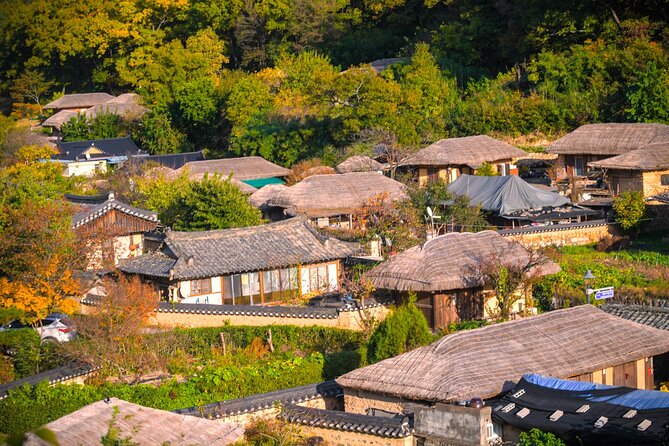
The tour typically accommodates a maximum group size of 43 travelers, ensuring an intimate and personalized experience as they embark on the journey from Busan to Gyeongju.
Participants are transported by air-conditioned coach or minivan, providing a comfortable and efficient mode of transportation throughout the full-day excursion.
The tour’s transportation arrangements offer several key benefits:
- Climate-controlled comfort for the duration of the trip, protecting travelers from the elements.
- Efficient travel between Busan and Gyeongju, maximizing the time spent exploring the UNESCO World Heritage site.
- The ability to accommodate larger groups while maintaining a personalized feel, allowing for a more enjoyable and enriching experience.
Frequently Asked Questions
Are Photography and Video Recording Allowed at All Sites?
Photography and video recording are generally allowed at most historical and cultural sites, but there may be some restrictions or prohibited areas. It’s best to check with the site staff for specific policies before taking photos or videos.
Can I Bring My Own Food and Drinks on the Tour?
You can generally bring your own food and drinks on tours, unless the tour operator specifically prohibits it. It’s best to check with the tour provider beforehand to confirm their policies around outside food and beverages.
How Much Free Time Is Provided for Independent Exploration?
The tour typically provides some free time for independent exploration, allowing visitors to wander and discover the city’s highlights at their own pace. Exact duration of free time may vary between tours.
Are There Any Options for Vegetarian or Halal Meals?
While the tour doesn’t include meals, the guide can provide recommendations for nearby vegetarian or halal dining options. Travelers can explore local restaurants at their own pace during the tour’s free time.
Can I Request a Private Tour Instead of a Group Tour?
Yes, you can request a private tour instead of a group tour. Many tour operators offer customized private tours that allow for a more personalized experience. This may come at an additional cost but provides more flexibility and exclusivity.
Recap
This guided day tour from Busan takes visitors on a captivating journey through Gyeongju’s rich cultural legacy.
Highlights include the magnificent Bulguksa Temple, the serene Seokguram Grotto, and the charming traditional villages of Yangdong and Hahoe.
With hassle-free transportation and an English, Chinese, or Korean-speaking guide, this tour provides seamless access to Gyeongju’s iconic UNESCO World Heritage sites, cementing its status as a premier cultural destination.
More Guided Tours in Busan
More Tours in Busan
More Tour Reviews in Busan
- Gyeongju ONE-DAY Highlights for PRIVATE CRUISE PASSENGERS
- (Private Vehicle) Busan Tailored Tour: Curation for Food,Design,History,Culture
- 4DAY Private Tour From Busan to Seoul, Gyeongju, Tongyeong, Oedo-Botania Island
- Busan: Oriental Medicine Experience – Detox Your Body and Mind
- Make Your Own Makgeolli (Rice Wine) in Busan
- Enjoy the Night View of Busan From Bongnaesan Mountain in Yeongdo.
Not for you? Here's more things to do in Busan we have recnetly reviewed
- 4 Best 2 Day Tours In Busan
- 2 Best 3 Day Tours In Busan
- 5 Best Food Tours In Busan
- 5 Best Full-Day Tours In Busan
- 11 Best Cruises And Boat Tours In Busan
- Day Trip to Beautiful Korean Marine National Park, Hallyeohaesang
- UNESCO Tongdosa Temple + Gourmet Eonyang Style Bulgogi Lunch
- Gamcheon Cultural Village & Skywalk & Markets
- The Way of Tea – Experience
- Geoje Oedo Botania Island From Busan
- Suncheon One Day Tour From Seoul, Busan or Suncheon Station
- 1-Day Gyeongju UNESCO and Culture Tour.
